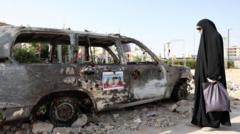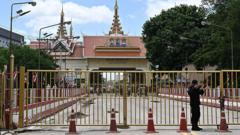Amid escalating tensions, Israel accused Iran of breaking a recently brokered ceasefire, leading to threats of military retaliation.
Ceasefire Tensions Escalate Between Iran and Israel Amid New Violations

Ceasefire Tensions Escalate Between Iran and Israel Amid New Violations
Iran and Israel's fragile ceasefire faces challenges as accusations of violations emerge, threatening renewed conflict.
Israel has accused Iran of breaching a fragile ceasefire just hours after it was established through negotiations involving former President Donald Trump and Qatar. Israeli Defense Minister Israel Katz warned that the military would respond with "powerful strikes" to Iran's alleged violation. Conversely, Iran has denied launching missiles towards Israel and has pledged to retaliate against any further Israeli assaults.
The ceasefire came into effect shortly after 05:00 GMT on Tuesday, with Trump announcing the deal on his Truth Social platform, urging both parties to maintain peace. The Israeli government confirmed acceptance of the ceasefire proposal shortly after 06:00 GMT when Iran indicated a willingness to halt its attacks if Israel followed suit. However, this truce was quickly threatened as Israel accused Iran of launching fresh attacks just hours later.
The ceasefire agreement was described by Trump as bringing an end to the "12-day war," following Iran's missile launch at a U.S. base in Qatar, which was presented as retaliation for American strikes against its nuclear infrastructure over the weekend.
As tensions mounted, the Israel Defense Forces (IDF) reported identifying missiles fired from Iranian territory. Katz characterized Iran's actions as a "complete violation" of the ceasefire terms, directing the military to continue offensive operations targeting Iranian assets. In defiance, Iran's military command denied any missile activity and declared that any new Israeli aggression would provoke a decisive response from Tehran.
Before the ceasefire took effect, both nations exchanged heavy fire. The IDF's pre-ceasefire strikes resulted in casualties, with four people dead and numerous injured in Beersheba. Iranian media stated they had executed one final missile barrage aimed at Israel before the ceasefire commenced. Reports from Tehran indicated significant air defense engagements, reflecting heightened security concerns.
As the situation remains volatile, accountability for the violative actions hangs in the balance, leaving much uncertainty about how these accusations and counterclaims will influence the broader conflict landscape.
With ongoing developments being reported live, both countries are on alert for any escalation of hostilities that could derail the tentative peace.
The ceasefire came into effect shortly after 05:00 GMT on Tuesday, with Trump announcing the deal on his Truth Social platform, urging both parties to maintain peace. The Israeli government confirmed acceptance of the ceasefire proposal shortly after 06:00 GMT when Iran indicated a willingness to halt its attacks if Israel followed suit. However, this truce was quickly threatened as Israel accused Iran of launching fresh attacks just hours later.
The ceasefire agreement was described by Trump as bringing an end to the "12-day war," following Iran's missile launch at a U.S. base in Qatar, which was presented as retaliation for American strikes against its nuclear infrastructure over the weekend.
As tensions mounted, the Israel Defense Forces (IDF) reported identifying missiles fired from Iranian territory. Katz characterized Iran's actions as a "complete violation" of the ceasefire terms, directing the military to continue offensive operations targeting Iranian assets. In defiance, Iran's military command denied any missile activity and declared that any new Israeli aggression would provoke a decisive response from Tehran.
Before the ceasefire took effect, both nations exchanged heavy fire. The IDF's pre-ceasefire strikes resulted in casualties, with four people dead and numerous injured in Beersheba. Iranian media stated they had executed one final missile barrage aimed at Israel before the ceasefire commenced. Reports from Tehran indicated significant air defense engagements, reflecting heightened security concerns.
As the situation remains volatile, accountability for the violative actions hangs in the balance, leaving much uncertainty about how these accusations and counterclaims will influence the broader conflict landscape.
With ongoing developments being reported live, both countries are on alert for any escalation of hostilities that could derail the tentative peace.























